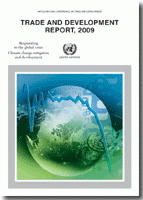
| Developed countries | US$ 55 |
| Developing countries | US$ 27.50 |
| Least Developed Countries | US$ 13.75 |
The Trade and Development Report 2009 presents a gloomy global economic outlook in the context of the ongoing global financial and economic crisis. It looks at the channels through which this deep crisis, which originated in developed countries, is spreading to developing and transition economies: through financial flows, international trade and commodity prices, migrants´ remittances and external debt.
The Trade and Development Report 2009 examines in some detail the short-term policy responses taken to tackle the immediate effects of this crisis. These include fiscal stimulus packages, monetary policy easing, and support for ailing financial institutions. Monetary easing and large bailout operations may have prevented a meltdown of the financial system, but they have been insufficient to revive global demand and halt rising unemployment. Countercyclical fiscal policy measures that have a direct effect on aggregate demand should be reinforced, in a coordinated global manner.
In analysing the causes of the crisis, the Trade and Development Report 2009 focuses on the role of excessive risk-taking made possible by financial deregulation and innovation in obscure financial instruments. It highlights the problem of the predominance of financial markets over the fundamentals of the real economy. The experience with this crisis proves that free financial markets do not lead to optimal social and macroeconomic outcomes, and suggests that the relationship between the State and market forces needs to be fundamentally reviewed. The Trade and Development Report 2009 discusses why and how the overall effectiveness of strengthened financial regulation will depend on the way in which measures for financial reform at the national level are combined with a reform of the international monetary and financial system.
Given the prevailing major shortcomings in the international financial and monetary system, UNCTAD draws attention to some elements of reform of the international financial architecture, which is long overdue. These include effective capital account management, strengthening the role of special drawing rights, and a multilaterally agreed framework for exchange rate management. These reforms imply a fundamental rethinking of global financial governance to stabilize trade and financial relations by reducing the potential for gains from speculative capital flows. This will reduce the likelihood of similar crises in the future and help create a stable macroeconomic environment conducive to growth and smooth structural change in developing countries.
Another pressing preoccupation for peoples and governments around the world continues to be the threat of global warming, which implies considerable risks for living conditions and developmental progress. Against this background, the Trade and Development Report 2009 is addressing the question of how increased efforts aimed at climate change mitigation can be combined with forward-looking development strategies and rapid growth in developing countries. Climate change mitigation should be associated with a process of global structural change, in which demand will shift from greenhouse gas-intensive modes of production and consumption to more climate-friendly modes. The challenge for developing countries will be to seize the growth opportunities created by the new and fast-growing markets in "environmental goods".


